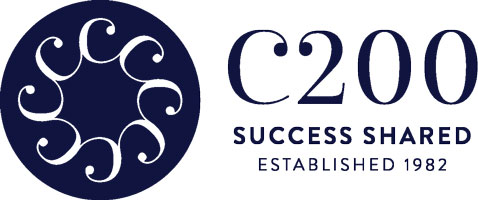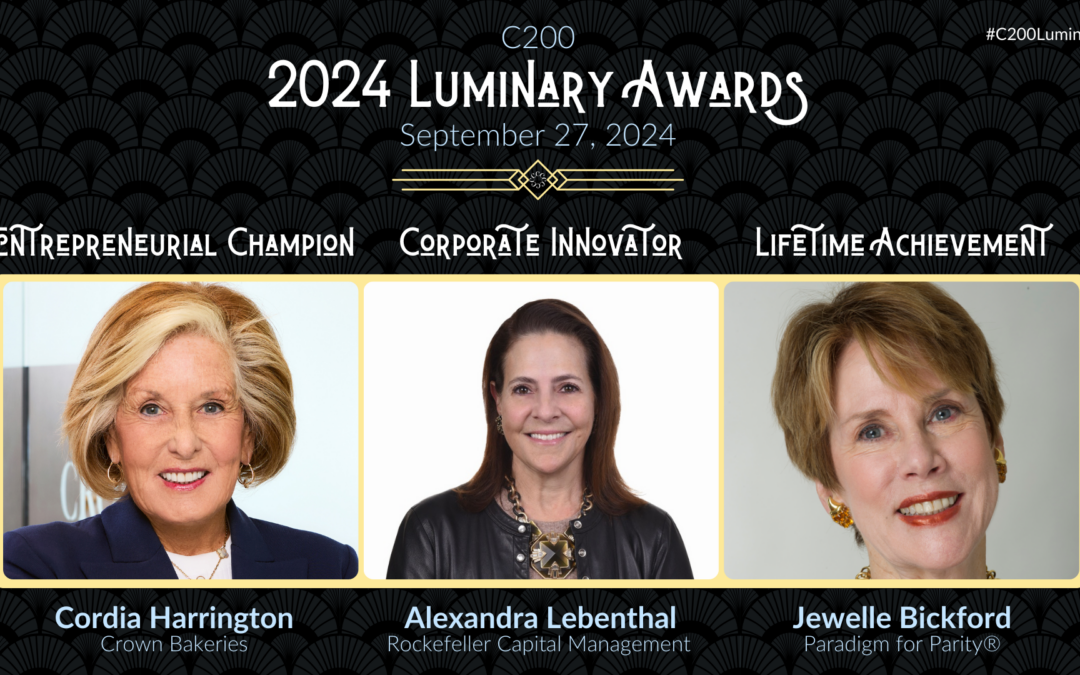
by Eva Glassman | Jul 8, 2024 | Blog, Featured
C200 is honored and thrilled to announce the recipients of our 2024 Luminary Awards!
We want to thank our members and the Luminary Awards Committee for an incredible nomination and voting process. We received a record number of nominations this year, all incredible individuals who have made significant impacts for businesswomen in their respective fields. We are proud of our record turnout this year and are excited to continue this wonderful tradition that celebrates and funds the advancement of businesswomen around the world.
This year, we have awards in three distinct categories: Entrepreneurial Champion, Corporate Innovator, and Lifetime Achievement. More information about the history of our Luminary Awards, how awardees are nominated and chosen, and detailed descriptions of each award category, can be found here.
Without further ado, here are the winners of each award:
Entrepreneurial Champion: Cordia Harrington | Crown Bakeries
Cordia Harrington is CEO and founder of Crown Bakeries, a highly-automated, high-speed baking company that makes over 15 million baked goods daily and employs more than 1,700 people, serving elite customers in the United States, South America and the Caribbean. As CEO, Ms. Harrington guides the executive team to successful planning, business development, sales and marketing, and brand management.
Ms. Harrington serves on the Ascent Global Logistics Board of Directors, the Global Crossing Airlines Board of Directors, and the Belmont University Board of Trustees. She is the immediate past Chair of the American Bakers Association Board of Directors and past Chair of the Chief Executives Organization Board of Directors.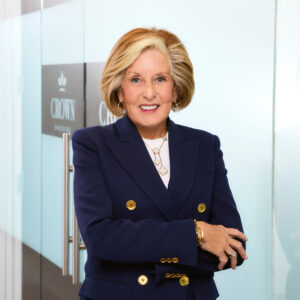
Under Ms. Harrington’s leadership, Crown Bakeries have received many awards, including the 50 Fastest-Growing Women-Owned Businesses, Business with Purpose Award, and Nashville Business Journal’s Best in Business Award. Ms. Harrington was listed on Forbes magazine’s list of 100 wealthiest self-made women in 2020, 2022, 2023 and 2024. The University of Arkansas awarded her an honorary Doctor of Humane Letters degree in 2020. Ms. Harrington was named Nashville Post’s 2020 CEO of the Year and was included on their list of “Most Powerful Women” in 2021. She was inducted into the American Society of Baking Hall of Fame in February 2018, and Directors & Boards magazine named her a “Director to Watch.” She received the Most Admired CEO Lifetime Achievement Award from the Nashville Business Journal in 2017 and has been recognized by numerous other organizations for her commitment to excellence and entrepreneurial spirit.
Ms. Harrington attended Kansai Gaidai University in Osaka, Japan; she graduated from the University of Arkansas with a Bachelor of Science degree. She currently resides in Franklin, Tennessee, with her husband Tom. Together they have five children and eleven grandchildren.
“I am deeply honored to be recognized by the members of C200 for the 2024 Entrepreneurial Champion Luminary Award. Throughout my career, I am proud that my professional endeavors have allowed me to create opportunities for working women. As the founder and CEO of Crown Bakeries, I believe our organization benefits greatly from female leadership, both in our bakeries and across our corporate landscape. Through C200’s mission to inspire, educate, and support women in business, we can make a difference together and impact the lives of other female entrepreneurs for years to come.”
Corporate Innovator: Alexandra Lebenthal | Rockefeller Capital Management
Alexandra Lebenthal is a Managing Director and Senior Banker at Rockefeller Capital Management where she leads Financial Sponsor Coverage. Prior to joining Rockefeller in October 2023, she was a Senior Advisor at Houlihan Lokey where she led an initiative focused on Women Led Companies within the Financial Sponsor Group. For the decade prior, she was the CEO of Lebenthal Holdings, a diversified financial services firm that included the nation’s largest woman-owned broker dealer. Coming from a storied Wall Street family, her grandparents, Louis and Sayra Lebenthal, founded Lebenthal & Co., Inc, a municipal bond specialist, in 1925. Her father, Jim Lebenthal, created a mass market for municipal bonds.
After starting her career at Kidder Peabody, Ms. Lebenthal joined Lebenthal in 1988 and became President and CEO in 1995 at the age of 31. She was also President of Lebenthal Funds, overseeing the firm’s mutual and money market funds. After successfully diversifying the firm beyond municipal bonds, Alexandra engineered its sale in 2001 to The Advest Group, remaining at the firm until it was subsequently sold to Merrill Lynch in 2005. During that time, in addition to managing Lebenthal, she also ran marketing and municipal capital markets for the parent company. She started anew in 2007, building Lebenthal Holdings into an asset management, wealth management and capital markets boutique. Lebenthal was the number one woman-owned firm in debt and equity capital markets from 2012-2016.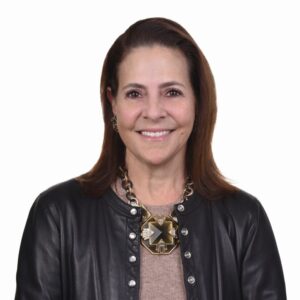
Ms. Lebenthal has had extensive board experience, including past roles at Broadridge Financial (NYSE-BR) and Care Investment Trust (NYSE-CRE). She was most recently a board member of Graf Acquisition Corp. IV (NYSE-GFOR). She is as a former board member and Treasurer of the Securities Industry Financial Markets Association (SIFMA). She is a member and the Northeast Regional Chair of C200, the leading organization for female businesswomen.
Ms. Lebenthal was named one of the top 50 Women in Wealth Management by Wealth Manager Magazine, as well as Private Asset Management. She has also been named to the Crain’s New York Top Women-Owned Businesses and the Crain’s Fastest 50 Growing Businesses in New York. More recently, she was named to Crain’s New York Business’ 2022 Notable Women on Wall Street, and to the 2023 Most Influential Women in Mid-Market M&A by Mergers & Acquisitions Magazine, as well as an Honorable Mention in 2022.
Ms. Lebenthal is the Co-founder of “The Women’s Executive Circle,” and “Women On Wall Street”, which cultivates high-profile Jewish women under the auspices of United Jewish Appeal. She is also a spokesperson for Insightec Targeted Ultrasound, a ground-breaking procedure for Essential Tremor she underwent in 2016.
Ms. Lebenthal’s first novel, “The Recessionistas,” a thriller set in Manhattan during the financial crisis, was published in August 2010.
A graduate of Princeton University with an A.B. in history, Ms. Lebenthal lives in New York City.
“I cannot tell you how much receiving the Corporate Innovator Award means to me. Every woman who is a member of C200 has achieved incredible success, so to be recognized by this amazing group of women makes it all the more special.”
Lifetime Achievement: Jewelle Bickford | Paradigm for Parity®
Jewelle Bickford is an investment banker who became the only woman in the United States named a global partner in the Rothschild Group. In 1994 she merged Bickford & Partners, Inc., her boutique securitization investment banking firm, into Rothschild Inc., in New York. Bickford & Partners had been consistently rated among the top five firms in the nation in the private placement of securitized assets. From 1994 to 2009, she was head of Debt Capital Markets at Rothschild Inc., where she specialized in the securitization and private placement of non-mortgage assets such as leases, credit cards, auto loans and other receivables. She was also a member of NM Rothschild’s Global Banking and Treasury Committee in London.
From 2009 to 2013 Mrs. Bickford developed GenSpring MultiFamily Office’s Women and Wealth program, and from 2013 until the end of 2020 she was a partner at Evercore Wealth Management creating the firm’s Private Wealth Education programs for families. Prior to founding Bickford & Partners, Inc. in 1998, Mrs. Bickford had spent eight years at Dillion, Read and Citibank’s municipal bond department. Before that, she had worked for three years for Mayor Edward Koch as the Director of the Mayor’s Community Board Assistance Office.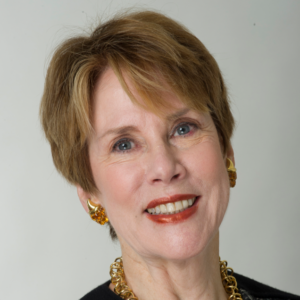
Mrs. Bickford is a member of the Council on Foreign Relations and the founder of its Women and Foreign Policy Program, the Council’s task force that analyzes how elevating the status of women and girls advances U.S. foreign policy objectives and seeks to inform policymakers and the public on issues relevant to gender equality and U.S. foreign policy. Mrs. Bickford is a member of the board of two SPACs, Athena and Hera, which seek to acquire Fintech companies and take them public. She also currently serves on the board of EL Education, Inc., a twenty-seven year old non-profit corporation that resulted from a collaboration between The Harvard Graduate School of Education and Outward Bound USA. EL Education created new and exciting classrooms and teaching methods that have now been adopted and are flourishing in the entire Detroit, Charlotte and Denver school systems and a host of individual schools from coast to coast.
Mrs. Bickford is founding member and Co-Chair of Paradigm for Parity®, a group of CEOs, senior executives, corporate board members and business academics committed to achieving gender and racial parity at senior levels for women by 2030.
She is a member of the Business Committee of the Metropolitan Museum and a member of the Committee of 200. She was formerly a member of the board of the Women’s Economic Forum, and a former trustee of Women for Women International, Women’s Media Center, and Randolph Macon Women’s College (now Randolph College). From 2003 to 2007, she served on the board of the SEC-registered Torrey Funds.
From 2003 to 2007, she was invited to attend Fortune’s Most Powerful Women’s Conferences and last year Crain’s New York Business named her one of the top 50 women in the wealth advisory profession.
Mrs. Bickford earned a BA from Sarah Lawrence College and is a graduate of Duke’s Fuqua Business School’s Leadership Program.
“I am honored to receive this Lifetime Achievement award from C200, a community and camaraderie of women of great achievement in the business world, and a community which I’m proud to be a member of myself. The quality and values of the C200 sisterhood are truly unparalleled, and I thank my fellow members for this recognition and their dedication to uplifting women in business.”
Join us in supporting our 2024 Luminary Awardees and C200’s mission to inspire, educate, support, and advance current and future women entrepreneurs and corporate-profit center leaders.
Congratulations to Cordia, Alexandra, and Jewelle for this remarkable achievement. We’re proud of the work you each have done over the course of your careers and the influence it has had for women in business worldwide.
Our award recipients will be honored and celebrated on the evening of Friday, September 27, 2024, at our Luminary Awards Ceremony during the Gala Dinner at our 2024 Annual Conference in New York City. Individual tickets, tables, and sponsorship opportunities for the Gala Dinner are available for purchase at our Conference website. Your support of our award recipients raises critical funds for C200’s larger mission and vision to advance businesswomen worldwide. Together, through the celebration of these incredible women, we can make a big impact in the business landscape by creating more opportunities, spaces, and time for women in business to connect with, inspire, and help one another succeed in male-dominated spheres and set examples for the next generation of women leaders.
Note: If you have registered for the 2024 C200 Annual Conference, your registration includes a ticket to our Gala Dinner.

by Eva Glassman | Jun 18, 2024 | Blog, Featured
By Katie Calhoun, Fmr. Getty Images | C200 member since 2023
Generative AI offers powerful tools for creating compelling visual content and enhancing consumer engagement. In this Forbes article, C200 member Katie Calhoun explains how brands can forge genuine connections with customers by thoughtfully integrating AI innovation into their storytelling strategies, as well as these insights:
- Why Visual Content Matters: Imagery is our universal language – from memes to marketing. As photos, videos, and emojis dominate our screens, authenticity has taken center stage. Brands that embrace authentic and organic images resonate with consumers.
- The Authenticity Revolution: Nearly 90% of consumers crave authenticity. They prefer brands that are genuine, not perfectly packaged. Dove’s Real Beauty and Patagonia’s Buy Less, Demand More are setting the standards.
- Generative AI’s Impact: Generative AI is flipping the script. By being intentional and accountable, marketers are empowered to connect authentically. Brands are encouraged to use AI tools to enhance rather than replace human creativity and empathy in crafting narratives.
You can read the full article here.
Photo credit: metamorworks/iStock

by Eva Glassman | Jun 6, 2024 | Blog, Featured
By Sally Hurley, VIPdesk Connect | C200 member since 2021
C200 member Sally Hurley‘s work as CEO of VIPdesk Connect exemplifies the power of women’s leadership in driving industry advancements.
In her June 2024 article in our Forbes Column, she explores the transformative impact of AI on customer service, offering practical advance for business leaders navigating this new technological landscape.
You can read the full article here.
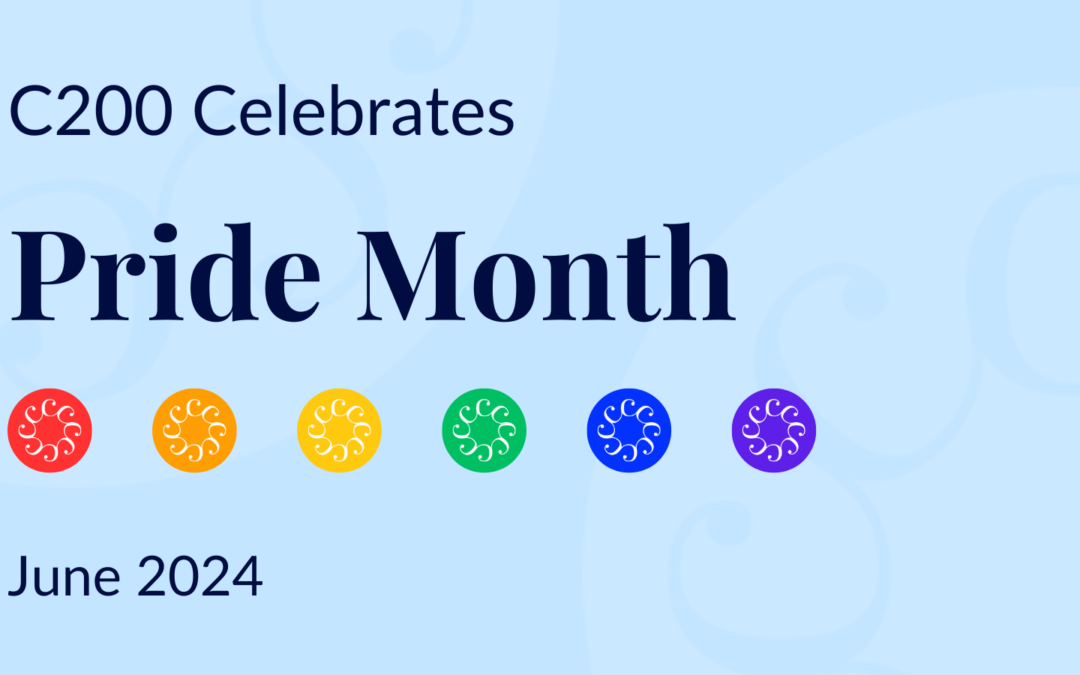
by Eva Glassman | Jun 1, 2024 | Blog, Featured
In addition to celebrating our LGBTQ+ sisters in business this June, we want to bring attention to the disparities they face in the journey up the career ladder to those C-Suite and senior leadership positions, because the fight for equity is far from over. Did you know that, according to Catalyst, just .4% of Fortune 500 board seats are held by openly LGBTQ+ directors? And that’s all LGBTQ+ individuals, not just women.
The lack of LGBTQ+ leadership in business goes all the way down the professional ladder, especially for women. Less than half of gay women and just 20% of bisexual women are out to all their coworkers, according to Catalyst.
Ensuring everyone has the space and support to be themselves in the workplace now is how we will see more diverse leadership in the future. It’s important to support and uplift LGBTQ+ women in the workplace, creating a more inclusive and diverse environment for all.
Let’s use this month to not only celebrate but also advocate for equality and acceptance for all members of the LGBTQ+ community in the business world. Together, we can create a more inclusive and equitable world for everyone.
Below, you will find resources to educate yourself about the experiences of LGBTQ+ women in the workplace and how we can be better advocates for our sisters in the LGBTQ+ community. You’ll also find additional educational resources about other communities also impacted by marginalization, because we must all come together in the fight for equality in the business landscape.
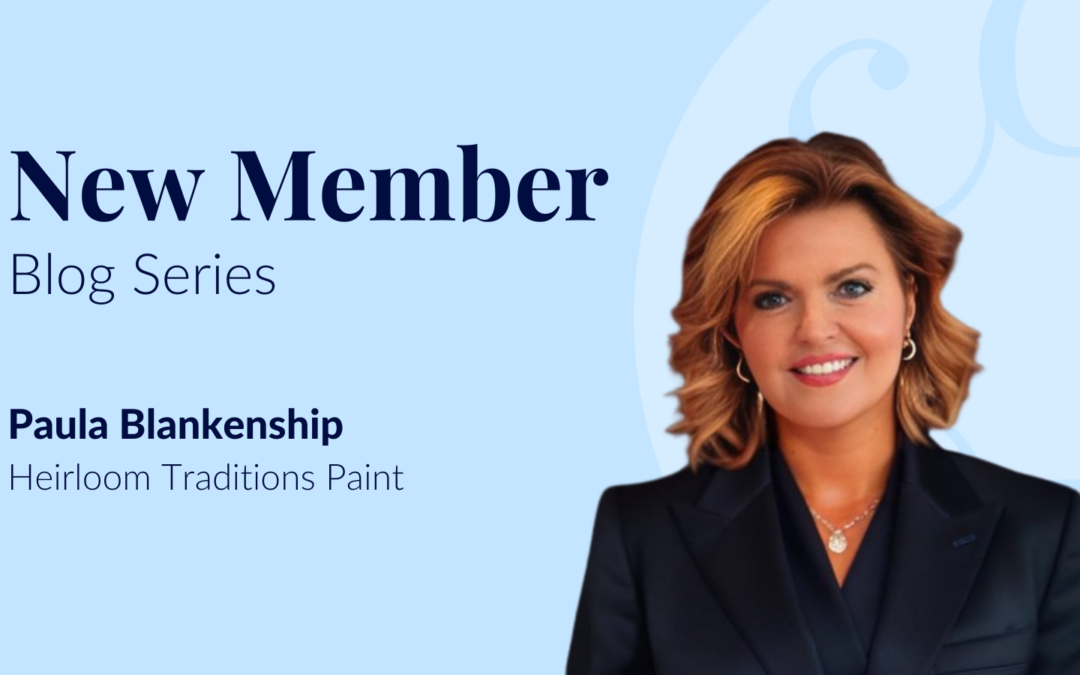
by Eva Glassman | May 28, 2024 | Blog, Featured
Paula Blankenship is Founder & CEO of Heirlooms Traditions Paint, a business she started in 2013 to help educate her teenage son about the value and importance of entrepreneurship. Paula comes from a long line of entrepreneurial women, her mother, grandmother, and great-grandmother all having owned respective businesses. Paula believes the taking off and success of her company stems from her risk-taking strategy and utilization of social media to engage directly with customers. Outside of work, Paula enjoys painting in her studio and being a grandmother to her 1-year-old grandson and six step grandchildren. Paula has been a member of C200 since January 2024.
Eva Glassman: Tell me about how you founded your business. How did you get into the industry? How were you able to grow it, and what is your day-to-day like now?
Paula Blankenship: Before my current business, I had ran and owned various furniture and floor covering stores, and I was also a commercial interior designer. My entrepreneurial sensibilities come from a long line of women in my family; my mother owned a furniture store, my grandmother a farm and restaurant, and my great-grandmother a hotel.
My passion for DIY in particular, however, comes from my mother; rather than buying new furniture for her own home, she would paint what she already had in the warehouses. Painting was a source of therapy and relaxation for her. She was a wonderful entrepreneur; she had her hands in everything, from building homes to running the store. She always knew how to take something broken and repair it beautifully—and here I am in my own life now doing the same!
I started my paint business in my kitchen when I was fifty, a single mother raising my son, Braden, who was a teenager at the time. We had just moved to Louisville, Kentucky and my son didn’t have a great network of friends just yet, so I thought this new business venture would give him something to do and teach him about the importance of entrepreneurship.
I had no desire to turn my business into anything large; I was busy enough travelling around the region as a commercial interior designer. I started selling my paint product on eBay with a goal of selling $100 per day. My original plan was to sell color cards and start a business taking customers’ knockdown furniture and painting it, but when I posted the color cards on my Facebook Page, someone asked if they could buy the paint. I said yes—and wondered how I was going to create a paint line! One thing led to another, and I had all kinds of people on eBay asking if they could become a retailer for my paints. That helped me start the paint business and catapult my furniture business at the same time. I had about 300 retailers in less than a year; people loved the paint!
As we continued to grow, I saw an opportunity to do something unique and different. We grew another side of the business with online seminars showing people how to use the paint and what it really looks like. I had always been a retailer sitting in front of a door, waiting on customers to walk into my store—sitting and waiting. However, it’s a different world with the Internet because we can so easily share things. I would just take a photo and share it, and suddenly, people all over the country are interested in my products.
I encountered a couple of roadblocks with this strategy, however. Firstly, it was harder than I anticipated trying to educate the mom-and-pop retailers who stocked my product on how to utilize social media. Secondly, it started getting to the point where the inability for us to sell direct to the consumer began to limit our reach and scope. For those reasons, and especially because small retailers were closing more than opening across the country, I had to make a difficult choice to shift from B2B to B2C. It was a huge risk, but we were headed down an unsustainable path, so we had to pivot.
To make it work, we leaned even harder into social media and Facebook. We learned how to create and run digital ads, and I created lots of video content demonstrating how to use our paints. It was extremely DIY—I was making videos on my phone with iMovie! Everything was organic, but it paid off; we did $4.5 million in sales in just a short period of time, and that was four times over revenues we’d never seen before. The following year, we hit $10 million.
The reversal of that “retailer watching the front door and waiting for customers” mindset was key. Instead of waiting for the customer, we went to them with Facebook video content, and eventually, I couldn’t answer people quick enough.
EG: That’s amazing how vital a role social media has played in the growth of your business.
PB: We couldn’t have done any of it without the Internet. The wonderful thing about social media is that it’s so easy to find out more about brands that advertise online. It’s our biggest opportunity for customers to get to know us and trust us over big box brands. People value brands that feel authentic and real. In this environment, with everyone having a phone and a voice, if we did not deliver as a business, we wouldn’t have a brand.
EG: What else have you been able to do as a result of that growth and success? What are things like now?
PB: A couple of years ago, we decided to turn our business into an ESOP; the business is now 49% employee-owned. That’s been such a blessing to us all because a lot of these people understand what it is to build a business, and they’re excited to help us continue to build. Whether we change hands, sell, or change ownership, they’ll be rewarded for it, and it doesn’t cost them anything. I’m a huge advocate for ESOPs; it’s empowering to know the true ins and outs of the business as an employer and have that be completely transparent—especially if you’re a woman, because most of us don’t know those things. People need to understand the business, so I think ESOPs are a great platform to help people, especially entrepreneurial women, learn in a hands-on way.
We now run out of two buildings—one in Taylorsville and one in Louisville. The company recently reached woman-owned status when I bought the Louisville manufacturer that produced our paint products. That, in addition to now having three chemists on staff, has opened the doors for us to expand our product line to include other kinds of paints.
It’s wonderful to see how many people use our paints, take up some DIY projects, save money, and make real transformations that improve the quality of their lives. I feel privileged to help so many people change the way they feel about their home and encourage them that all they have to do is pick up that paintbrush to make their world something they enjoy. It’s way more than paint for me. I get emotional when I talk about it because it’s something I never dreamed would happen, and now that I have this platform, I have to do something great with it.
EG: Where does C200 fit into your professional journey? How did you get involved with the organization, and what made you join?
PB: I was in a JPMorgan Chase call with several other businesswomen, and I was trying to find a professional women’s organization to join at the time. I was in one already, but I wanted more out of it, especially as a woman running a big business with lots of dollars at stake. The women I was on the call with strongly recommended I check out C200 for that reason.
As a female entrepreneur, the more successful you become, the fewer friends you have. Not because people don’t like you anymore, but because what I love to talk about for fun is probably really boring to women who aren’t in business! Once you get to a certain financial level in your business, the air gets pretty thin and lonely for women. I’d like to have a community of women who I can meet, travel, and socialize with, in addition to having opportunities to sit down, talk, and chat to see what they’re facing and how we can learn from each other professionally.
EG: When you were growing your business, who are the women you would turn to for advice? Who were your mentors?
PB: I had no mentors—one of my big mistakes. However, Martha Stewart is someone I’ve always admired. She’s an entrepreneur who came into her business at fifty, which resonates a lot with my own experience. I like that she never let her age define how she strategized with a brand. I’m a risk-taker as an entrepreneur, so I look to Martha Stewart as a great visionary for taking on big risks and making big decisions.
Something else I’ve learned from Martha Stewart’s story is that, when you grow your business, you really have to delegate to someone who can ride the journey with you and not leave to seek another job. It’s a huge amount of trust; you’re revealing a lot of your stuff to this person. I found that that’s been a big part of my business. Our current CFO, Melissa Osbourne, helps me in more ways than just that; she takes this business as personally as I do. She’s helped build our online communities and our digital empire, jumping in headfirst with me even when we didn’t know what to do. I value her insights because she’s the more reasoned of the two of us; before I take a risk, she’s there to call me back down a little bit.
Another person who is integral to the business for me is my husband. Even though I’m the CEO, he’s still right there with me as President and helps me make decisions. He’s not a risk-taker, either—so I’ve got two very important people by my side to keep us in line! [laughs] Even though I believe certain risks I decided to take along the way helped grow our business to what it is today, their partnership does help me have a balance of opinions when it comes to making decisions. We have a give and take that has really worked for us as a team and as a company.
EG: You’re clearly incredibly hard-working and always thinking about where to take your business next, but I’m also curious about everything outside of your work and business. How do you like to spend your time?
PB: I’m a painter and have a studio in my home where I can escape. A lot of people paint to music, but I actually prefer complete silence. Something about the silence lets the painting talk to me so my creativity can flow. It’s so freeing to open up my mind and put something out there that comes from within. Sometimes I paint pictures to hang around the office, but I mostly just paint for myself.
I think art teaches you greats lesson about life, following through on things, and patience. Like painting, you have to let life flow in order for it to teach you something. If you stop painting and never pick it up again, it feels like an ugly, broken thing in the corner, so I always make sure to finish every piece I start and turn it into something I love. That’s how I operate in life: I like to take broken things and clean them up into something better or different. What does this thing need to make it something I’m proud of? That thought process is actually really helpful in my business: to take a step back, assess the situation, and identify what’s needed to get things back on track. Painting teaches me patience, to see through the ugly phase and get through the process until it’s something pleasing.
I’m also a grandmother—I have six step grandchildren and my own grandchild who just turned a year old. I talk to him on the phone all the time, even though he mostly just smiles and laughs. I get to keep him once a week or so, and on the other days, I’m just sitting around waiting for my chance to squeeze that little boy again!
EG: What does being a “woman in business” mean to you, and how do you apply that to what you do?
PB: My parents were in business when I was growing up; I rode my tricycle around the family furniture store. My mother was the force behind it all; my dad followed her lead. If I hadn’t been so immersed in the entrepreneurial world, especially with my mother at the helm, I wouldn’t have been so fearless about my own business ventures. I was never worried about being in debt, opening a business, having inventory, payments, big payrolls; I grew up conditioned to all of that.
As I shared earlier, my entrepreneurial tendencies go back even beyond my parents; my grandparents owned a successful farm and restaurant—farm-to-table before it was a thing! Even my grandmother’s mother owned a hotel back in the day. It’s kind of amazing how many women entrepreneurs run through my family.
All this to say—it’s a man’s world in the business I’m in. Last month, word got to me that one of the male plant managers here in Louisville had said to someone that he doesn’t like working for women and didn’t want to work for another woman. Last week, I had a meeting with him in these newly-remodeled offices and he said, “You’ve done more in the last two months than the previous owners had done in 20 years.” To be a woman in a man’s world, you have to earn their respect. It’s sometimes about conquering the non-believers and naysayers with more than words—you have to show them the proof is in the pudding. You have to walk the talk.
EG: What other lessons have you learned along the way that you believe other women entrepreneurs, especially those growing their businesses right now, should know?
PB: I’m reminded of a quote from Oprah: “Doing the best at this moment puts you in the best place for the next moment.” I’m looking for the next best move, not ten moves ahead. What we do today propels this business to the next level, and that has served me well.
Taking risks, but also taking things one day at a time, is the thrust of who I am. It’s easy to get caught in the spiral of “What ifs,” but I don’t think like that. I see a next step to execute now, and if it’s wrong, we’ll divert and continue to zig and zag until we find our way. In my mind, there’s no gain without some risk; you cannot gain by sitting and waiting. If you’re not moving forward, you’re moving backwards. If every decision you make is easy, you’re not making important decisions.
I don’t sit around and wait for affirmation—I pull the trigger. If you wait until everything is “perfect,” you’ll miss your window of opportunity. Let things roll and fix it as you go along. Those have been big key drivers of my success: being proactive, not always seeing what the path forward is, but knowing the next best move to make with the competition at my heels. As long as I’m driving this ship, we’re going to keep moving fast and be a hard target to hit. That’s who we are—that’s who I am.
EG: What are you most excited about as a new C200 member?
PB: Last spring, I saw that Ashley Black got into C200, and I was so thrilled to see that news because I feel as though we have a lot in common. Like me, she’s an entrepreneur who charted her own course and turned something she believed in into a large ecommerce business. Like me, she didn’t have many mentors along the way, either. I’d love to learn from Ashley and exchange wisdom, as well as meet other entrepreneur members to learn their stories and insights. There is so much combined experience in the C200 sisterhood to learn from, and I can’t wait to get started.
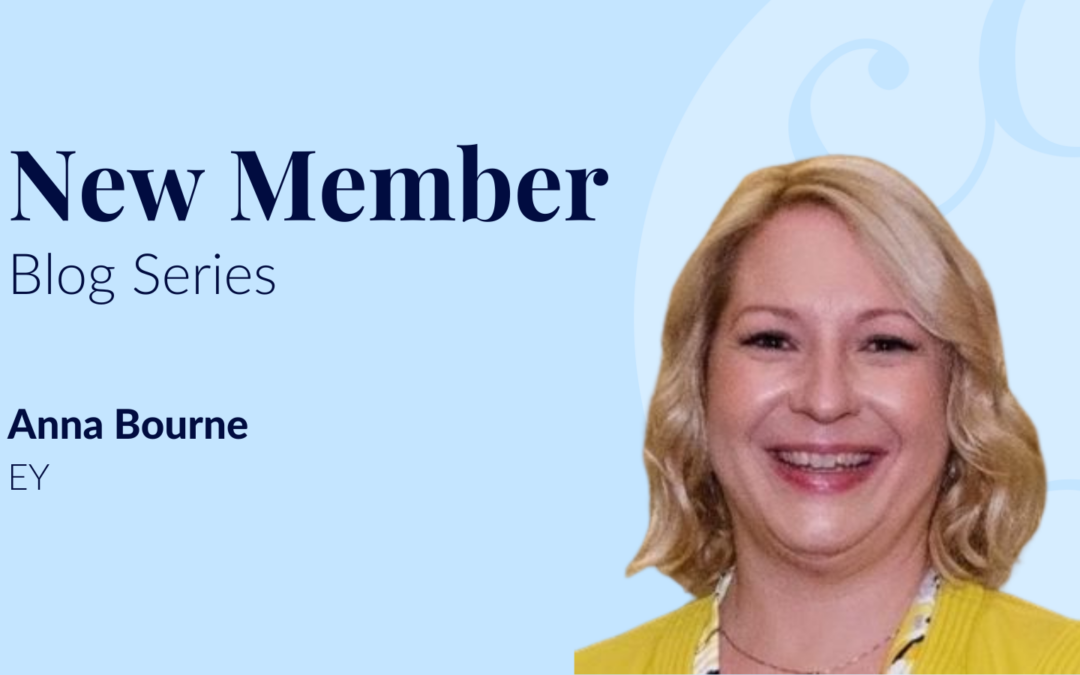
by Eva Glassman | May 14, 2024 | Blog, Featured
Anna Bourne is a Global Client Service Partner at EY, whose responsibilities include leading global accounts and executing business transformations for multi-national Fortune 250 clients. Anna is a strong advocate for DEI and believes that women hold the key to continuing a supportive and inclusive workplace culture. Outside of work, Anna enjoys a good hike, spending time with her four kids, and a competitive round of bridge. Anna has been a C200 member since January 2024.
Eva Glassman: What does it mean to be a Global Client Service Partner at EY?
Anna Bourne: I am basically the CEO of all the services that EY provides to my global clients and responsible for the scoping, contracting, delivery, and quality of the work.
I also have a second role, which is market leadership on the east coast for EY’s Advanced Manufacturing and Mobility sector. We do the revenue planning and accounting enablement discussions of the accounts in the east that fall under that sector to make sure that those accounts are being properly served. We break them up into groups in terms of size and scale and figure out what we can do when we create a bespoke solution for a client and how we can leverage that through the sector.
EG: What do you spend the most time doing on the day-to-day?
AB: You never know what the day is going to be like because, in addition to my two roles, I have the pleasure of serving on our Global DEI Steering Committee. While there are certain regular cadences like earnings calls, different things take precedent depending on the day. For example, deals can start as a whisper and then turn into a freight train very quickly. Some of the timelines are very aggressive and you never know what will boil up to the top.
While I can’t say my week is 20% of this role, 40% of this role, and so on, I have amazing teams across all my roles that can help juggle things to the finish line. The skill sets to bring out in certain people on certain teams are all different, but that’s the secret to why we’re high-performing.
EG: I’m curious about your career journey. Where did you start, and how did you end up here? Why do you think it all worked out?
AB: I went to school at University of Wisconsin – Madison, and my parents had always told me not to rely on anybody else, to make sure I could find my own way in the world, so it was important for me to pick a profession that I’d be able to support myself with. Back in the day, that was accounting, so that’s the path I followed. I was okay at it, but I didn’t particularly like it.
After I graduated, I started out in a “Big Eight” company in external audit, and while I learned a lot in that first role, I always felt like I was looking in the rearview mirror. I wanted to do something that was forward-looking or contributing to the success of something, versus, as my father would say, “bayoneting the wounded after the battle.”
So, I took a role with a client and left public accounting for two years. I was the assistant controller and officer at Federal Signal Corporation and learned a lot from the role. It was eye-opening to see accounting from the client side and to realize the impact I could have doing things like process improvement work or strategic transformations—things that would actually make the business and environment better.
Eventually, however, I became uninspired by my work and wanted more of a challenge. That’s when I decided to return to the firm and focused primarily on automotive clients like Caterpillar, Navistar, and Tenneco. At the time, they were creating a different service line for the consulting side, so I was returning to something nascent and had the chance to get in on the ground level. I really enjoyed that, because there was so much opportunity to create improvements and forward-looking things.
The firm saw how I was excelling at my job and asked me to relocate to Atlanta and run a practice. Before this, I had only been responsible for client services; now, being on both the OPS and talent side was an eye-opening experience. It was much harder than I anticipated, but after three years, the firm said something to the effect of, “Why don’t you move up and run a practice three times as large in New York?” By then, I knew I could do it; I was in that role for several years.
Eventually, the firm informed me that someone on the Executive Board was stepping down due to health issues and needed someone to fill his role, which was not on my radar at all. However, I felt glad to work for a firm that was concerned enough about someone’s health to immediately say, “You need to focus on your health,” and get someone else to fill in—so I said yes. I am lucky that my deputy was able to take over my role so I could move to this one. I came into it mid-year with no talent training, but I learned a ton.
After a few years, I was interested in being on what we call G360s, so I took on one of the top accounts in the firm, and I think that is the best job I’ve had. Eventually, the firm gave me the current job I have, so that’s how I ended up with two roles.
EG: What do you think was the biggest factor that led to your success and continuing to advance and move up?
AG: It’s always about being willing to try something new. People who are willing to get out of their comfort zone, have a growth mindset, and move onto something else recognize that all the things you’ve learned and experienced to that date will apply to something.
Even my experience raising four kids helped me learn and grow in my career—not because there’s child-rearing in my day job, but because some of the things you experience in your personal life can apply professionally. Do you want to be “right,” or do you want to achieve your goals? Do you want to stay married, or do you want to be “right”? For me, it’s always the second option.
You can’t worry about being right. You have to trust that you have the talent and skills, and that a learning curve is nothing to be worried about because we face them all the time. Lots of people stay in one spot for too long, get stuck in a rut, and become miserable; I’m a huge fan of term limits on certain leadership roles.
When I was on the Executive Committee and went back to client services, people asked me, “Did you job fail? Why would you leave an executive role to be in client services?” I’m a creative person—shouldn’t I get to be creative? The way people love to have their names and titles in boxes is a fascinating psychological study to me. It’s a lot more important to talk about what you’re learning from and giving to a particular role.
Often times, people see something in you that you don’t see in yourself, and so it’s important to have people around you who aren’t going to just pat your head and tell you, “You’re doing great!” Those people should be saying, “Let’s challenge that—you seem to have mastered that. How about adding something else?”
It’s easy to dig your heels in and think, “Why can’t everybody see it my way?” It’s much more fruitful to approach a situation thinking, “Let me hear your perspective and why or what led you to that conclusion.” I think it’s hard for people to do that, and there’s still a lot of people who are very self-interested. Self-interested leaders don’t create followership, and if you lack followership, you’re headed for a bad ending in that role.
EG: How did you get involved with C200? What drew you to the organization?
AB: I actually didn’t know much about C200 before joining. I was at an unrelated event last November, and one of the women I went with, Susan Skerritt, who is a retired partner at the firm, was going to a C200 meeting. I asked, “What is that?” I find out that Cindy Doe, Deidre Quinn, and all these other women I know and respect a lot are in it, too; I had no idea! I told myself I would check it out, and that’s how it happened.
I think a lot of women get asked to be on a bunch of women’s organizations, and it’s hard to see through the vastness of the market. C200 is different; it has a much better balance of what you contribute and what you get out of it than a lot of other organizations.
EG: Because C200 is all about women paying it forward, I want to know about your experience as a woman rising in her career. Did you have any women mentors?
AB: There were very few women in leadership when I started at the firm. Apparently, a few years before I started, we didn’t even have a maternity policy. Even today, we hire over 50% women and still don’t see that reflected in our leadership.
My mentors were primarily male until I was a senior partner and had the benefit of meeting a very talented woman who had been a Canadian partner and just came to New York. That opened the door to getting in touch with more women who were at the senior ranks; that mentorship was helpful, but it was much later in my career.
Early on in my career, the women who were advanced had a mentality of, “I found my way here, but I’m not going to help you.” As Madeline Albright said, “There’s a special place in hell for women who don’t help other women!” When I decided to have a baby, people said to me, “You should probably quit the firm because you clearly can’t do both,” to which I said, “Why not?” I do feel as though there were structures, both cultural and corporate, setting women back quite a lot by fellow women who felt that you should pay your dues. There’s a lot more willingness now for women to help each other and not feel like that’s taking something away from them. I’m glad to see that change, and we need to do everything we can to ensure that continues.
EG: Related to that, what does being a “woman in business” mean to you, and how do you apply that thinking to your personal and professional life?
AB: Although this is a generalization, I think women embrace the idea of empathy more and know how to appeal to the hearts and minds of others; a lot of inspirational leaders try to do one and not the other. Women understand the totality of people, and that helps create more inclusive spaces. Women in business are getting better at integrating in a way that’s genuine to them and authentic to who they are, and that’s doing a world of good in terms of creating more people who want to follow that model.
When I first started out, I would never tell anyone when I needed to take my kid to the doctor; meanwhile, my colleagues were taking four hours to the golf course. Those kinds of things are hopefully becoming things of the past, and now we’re prioritizing people being allowed to bring their whole selves to work. Female leadership does a solid job of that and doing it for the right reasons turns out to have a very big impact on business.
EG: A woman’s experience growing up in the world, both what they perceive and how they are perceived alike, really informs how they lead, and it often times shows in how they include others in the workforce.
AB: In my Global DEI Steering Committee role, we’ve spent some time learning that there’s a consistent issue in assumed universality, which creates implicit bias. To use affluence as an example, people growing up in certain wealthy areas assume everyone has the same experiences. For example, I often hear people say, “Oh, you don’t ski?” It leads me to wonder how we can create common ground without making someone feel stupid or “less than” for, say, not skiing.
Women are better at asking questions that don’t put themselves at the center. If someone says they don’t ski, you can ask about what they enjoy doing and go from there. There’s a way to pivot the conversation without sounding pejorative and making the person you’re speaking with feel othered. It’s so interesting to me how that idea of having “have-nots” creates a confirmation bias.
EG: How do you like to spend your time outside of work?
AB: I love to hike and get outside. My husband is a great chef and has a wine cellar, so I eat and drink well. I’ve got a German Shepherd and he’s the smartest dog I’ve ever had.
My youngest child is studying abroad, so I’m excited that all of them are out and living their lives. Besides spending time with my kids, I enjoy bridge. I know it’s a game that, according to my colleagues, is popular with a demographic much older than mine, but all my kids play, and my daughter-in-law is learning. We like to do things that are slightly competitive.
EG: What is your advice to aspiring female business leaders to advance their careers? If you could go back and tell your younger self one thing, what would it be?
AB: Networking is a really strong thing. Getting a “Board of Directors” or outside perspective to help when you’re struggling with something that you can’t go to your team with is also important. Get different perspectives and other ways to look at things. Ask for contrarian points of view and make sure you’re doing what you do for yourself first and foremost.
Women will run to the eleventh hour when it’s not the best thing for them or their health, and they don’t realize it because they like to be needed. Make sure you set some boundaries and live by them so that you can be in a good place for others.
EG: Finding boundaries can be difficult, because, especially for women in the workplace, you want to be able to stand alongside your team, have a good reputation, and have people respect you. There’s an element of having to “prove yourself” as a woman in most spaces that makes it very easy to let your boundaries break down.
AG: “No” is a complete sentence, people! There’s a problem with the boundary side for a lot of our female executives, and I think that’s something I’d do differently in my own career if I had to do it again. But having said that, I still would rather air on the side of doing too much than too little. What isn’t being done, and how can you contribute to that? Figure out what it is that you can have an impact on.
There’s a great Harvard Business piece about the “monkey on your back” and how there are some people who go around putting their monkeys on everyone else’s back. If you’re going to be what my parents called the “patsy,” you’re not going to further your career; you’re really just doing someone else’s work, and that’s a bad place to be.
EG: What are you most excited about as a new C200 member?
AB: Given that I hadn’t heard anything about C200 before joining, I joined because I was so excited to be a part of a community that so many women I know and respect are a part of. I’m going to the FunRaiser in June at Ginger Bailey’s Canoe Island Lodge. I’ve heard great things about FunRaisers, so I’m jumping in with both feet! I’m really looking forward to getting immersed in the organization, meeting a lot of members, and gaining a whole new network and support system.




